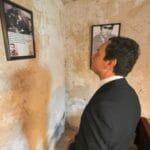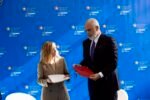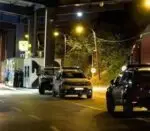Russian President Vladimir Putin has begun his fifth presidential term in a rare government shakeup, a decision analysts have seen as necessary to manage a long and costly war against Ukraine and the fallout from Moscow’s escalating confrontation. with the West. On May 12, Putin fired Russian Defense Minister Sergei Shoigu — considered among the Russian president’s closest aides, and mentioned as his potential successor — and replaced him with First Deputy Prime Minister Andrei Belousov, the economist 65-year-old, who previously served as Minister of Economic Development and is known as the person who centralizes Putin’s impulses.
By moving a man who has overseen an entire bloc of economic ministers to the Defense Ministry’s cabinet, Putin is signaling the priority he places on the war in Ukraine and increasing efforts to challenge the West, despite challenges with which he faces.
This is a message that Putin has emphasized in many speeches since the start of Russia’s war in Ukraine, in February 2022, especially in recent months. “The proposal to appoint one of the Kremlin’s leading economists to the Ministry of Defense could mean that Putin aims to win the war in the factories of the military-industrial complex as well as in international markets. Something like that makes sense because the economic bloc, in general, has been more effective during the war than the security bloc,” said Aleksandr Baunov, an analyst at the Carnegie Institute, in a post on Telegram.
The strategy for victory will not be developed through military mobilizations and penetrations, but through the application of slow pressure on Ukraine, through the great strength of Russia’s military-industrial complex and economy, which are working better, in all directions” , he added. Kirill Martynov, editor-in-chief of the Novaya newspaper, has said that Belousov’s appointment shows that Putin is trying to include the economy in the military sector – even more than it is now.
“Belousov’s main idea is economic mobilization in the service of Putin’s goals,” Martynov told Current Time, the Russian-language television network run by Radio Free Europe and Voice of America.
“100 percent” Putin’s man
The nationalist ideologue of the extreme right, Aleksandr Dugin, has congratulated Putin on the decision taken, considering it a “decisive step towards the Government of victory”. Many nationalists who support Russia’s war in Ukraine have sharply criticized Shoigu for the way he has managed the conflict.
Belousov has been part of the management team of the Russian economy for many years, including the engagement as Putin’s main economic adviser in the period 2013-20.
In the 2000s, he was seen as an adversary of liberal Finance Minister Aleksei Kudrin, having opposed many of Kudrin’s privatization initiatives, and spearheaded efforts to funnel most of the profits from oil and gas exports into the coffers. of the state. A government source told The Bell media network in 2018 that Belousov is the only economist in the Russian government who supported the annexation of the Ukrainian peninsula of Crimea in 2014.
This source has described Belousov as a “committed statist” who believes that Russia is surrounded by “enemies”. In recent years, he has overseen a national project of “unmanned aerial systems”, which has influenced the increase in the production of military drones in Russia. Kremlin spokesman Dmitry Peskov said on May 12 that the appointment of Belousov as Minister of Defense means that his main task is to “integrate the economy of the security bloc into the economy of the state”. According to Peskov, Russia’s budget has roughly matched that of the Soviet Union in the 1980s, when spending on the military and security agencies accounted for 7.4 percent of gross domestic product (GDP).
Aleksandra Prokopenko, a former analyst at the Central Bank of Russia and now a researcher at the Carnegie Institution, wrote on X – the platform formerly known as Twitter – that Belousov is “a good connoisseur of complex military issues” and “has orthodox beliefs”.
According to her, he is “100 percent Putin’s man”. “Putin is aware that the war will not end soon,” said Mark Galeotti, a Russian policy and security analyst, in several responses to Radio Free Europe. “As he aims for a long term – and we see this in his rhetoric, but also in the climate within the government apparatus – this is a war that will be largely won in industrial production. And this is where Belousov is good.” His job will be “to transform Russia into a state in which the military economy is the engine for everything,” political analyst Ivan Preobrazhensky told Radio Free Europe’s Russian Service.
“Very disliked”
Belousov’s appointment came as a surprise, but analysts have speculated that the 66-year-old Shoigu’s position has been increasingly weak since Russia failed to score a quick victory in Ukraine in the early days of the war. He and General Valery Gerasimov, the 68-year-old chief of the Russian army’s general staff, were the main targets of a brief mutiny by mercenaries of the Wagner group, led by Yevgeny Prigozhin, in June 2023.
Shoigu faced another blow last month when his deputy, Timur Ivanov, was arrested on suspicion of corruption. Putin has asked Shoigu to lead the Security Council, replacing him with Nikolai Patrushev, whose new appointment has not been announced.
Shoigu is deeply disliked by Russian military troops in Ukraine, Galeotti said. “Well, on the other hand, Shoigu is a friend, a close friend of Putin, and Putin is surprisingly loyal to him,” added Galeotti. Shoigu’s new engagement and the appointment of an economist as defense minister may mean that professional military officials will have to step up control over the military aspect of the war in Ukraine.
Something like this could also pave the way for Gerasimov’s replacement, Galeotti said. “Gerasimov has proven that he is not doing a good job and is not liked in the position of the chief of the General Staff of the army,” he said. “He enjoys even less sympathy than Shoigu. I wouldn’t be surprised if someone else is in that position.” Many of Ukraine’s pro-war bloggers have cheered the latest developments, interpreting them as a fight against corruption within the Ministry of Defense and the promise of increased military engagement in Ukraine and beyond. “The opportunity has finally come to get rid of the names of the era of [former president Boris] Yeltsin and create a central military plan on the eve of the great war with Western Europe,” blogger Dmitry Konanykhin said in a Telegram post.







